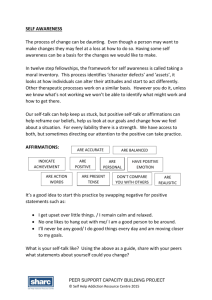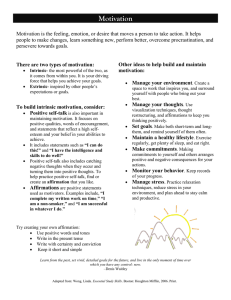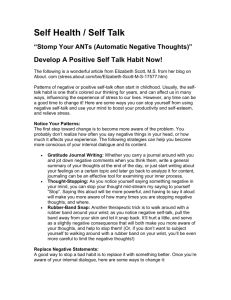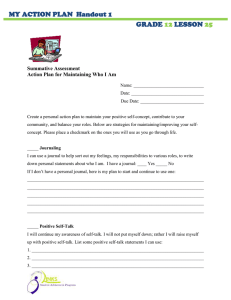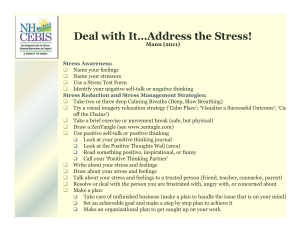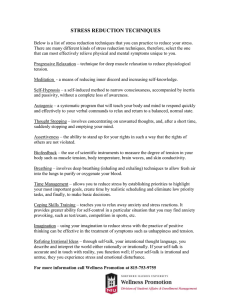Personal Development
advertisement
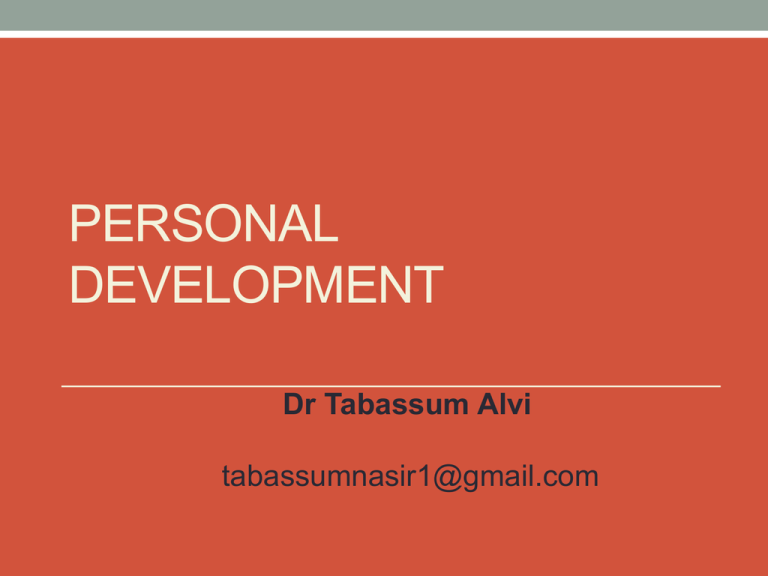
PERSONAL DEVELOPMENT Dr Tabassum Alvi tabassumnasir1@gmail.com LEARNING OBJECTIVES At the end of the session the student should be able to: • Apply the time management strategies to one’s own personal and professional life • Identify common stressors in day to day life • Manage one’s own stress appropriately • Provide sound advice on stress management to others • Discuss the benefits of positive thinking and how it can be used in professional practice Personal Development 1. Time management 2. Stress management 3. Positive thinking Time Management High urgency Low urgency High importance 1 Do it now 2) Plan to do it later Low importance 3) Resist doing it now 4)Time wasters SMART :Goal Setting S = Specific M = Measurable A = Action R = Realistic T = Time-based Time Management Prepare: • Daily activity log Identify: • Identify time wasters • Identify distractors Devise: • To-do list • Timetable Plan Weekly – short term tasks An Example of Timetable Before 9.00 Mon 9.00-11.00 11.00-13.00 14.00-15.00 15.00-17.00 After 19.00 Lecture: Myth 10-11 PB 101 Work in library 11-12 Lecture: Rome 12-1 HUM44 Keep free Seminar: Myth 3-4 URS21 Independent study Tues Lecture psychology Lecture physiology Lecture anatomy Swim/exercise Self study (upper limb) Watch TV/family time Wed Lecture Seminar: Rome 9-10 HUM15 Independent study 10-11 Independent study Badminton 2-3 Group study upper limb (Union night) Thurs Swim Independent study Independent study Lecture: Myth 2-3 PB101 Work in library 3-4 Lecture: Rome 4-5 HUM44 Film soc Fri Lecture: Epic 9-10 PB 105 Seminar: Epic 10-11 URS21 Independent study Independent study (Out with friends) Sat Relax Prepare for tomorrow task Sun Watch movie Study whatever done in the week Study whatever done in the week Independent study Make to-do list for next week (Out with family) 1. Time management Stress Management 3. Positive thinking What is Stress? ‘Any stimulus playing upon the body results in certain physiological and psychological changes in the body which are cumulatively known as STRESS’ External: Exams, Tragedies, Losses Internal: Thoughts(excessive negative thoughts) Believe(how do you look at yourself and life) Attitudes Over scheduling • • Failing to be assertive Failing to set and maintain healthy boundaries Procrastination and/or failing to plan ahead Is stress always harmful? Positive or Negative? Positive or Negative? Positive stress has the following characteristics: • Motivates, focuses energy • Is short-term • Is perceived as within our coping abilities • Feels exciting • Improves performance Positive Personal Stressors • Receiving a promotion at work • Starting a new job • Marriage • Buying a home • Child Birth • Moving to new place • Taking or planning a vacation Positive or Negative? Negative Stress has the following characteristics: • Causes anxiety or concern • Can be short or long-term • Is perceived as outside of our coping abilities • Feels unpleasant • Decreases performance • Can lead to mental and physical problems Negative Personal Stressors: • Death of a Partner • Hospitalization (oneself or a family member) • Separation from a spouse• divorce • Bankruptcy/money problems • Unemployment • Children’s problems at school • Legal problems • Inadequate or substandard housing • Excessive job demands • Lack of training necessary to do a job Question 1. What are the major life events in your life for the past one year? 2. What are the daily life hassles in your life? 3. What are the symptoms of stress in your body? 4. How do you cope with stress? Symptoms of Stress in your Body ? Stages of Stress 1) Alarm stage 2) Resistance stage 3) Exhaustion stage Stages of stress contd… Alarm stage Psychological changes act upon your body to produce changes e.g. Increased heart rate Increased respiratory rate Anxiety (due to adrenal activity) Decrease skin temperature Stages of stress contd… Resistance stage Body identifies the above changes and tries to minimize harm Behavioural – lack of enthusiasm & motivation for family, studies & life in general, withdrawn from society Cognitive – poor concentration, impaired problem-solving, nightmares Emotional – tearful, agitated, panic, anxious, guilt, overwhelmed, depressed Stages of stress contd… Exhaustion stage Overwhelming long term stress can cause various medical symptoms and problems. Eg Digestive system problems Recurrent infections Medically unexplained Pains Stress Management Strategies How to cope with stress?? Stress Management Strategies ‘The primary strategy should be to get rid of the stressor’ 1) Emotional Ventilation 2) Problem solving skills Stress Management Strategies 1. Physical 2. Mental 3. Both physical and mental 4. Spiritual Stress management strategies contd …. 1. Physical (a) Relax neck and shoulders (b) Massage (c) Exercise Stress Management Strategies contd …. 2. Mental (a) Count to 10 (b) Control your thoughts (c) Fantasize good images and safe place (e) Ignore the problem if appropriate, after evaluation (f) Counselling Stress Management Strategies contd …. 3. Both physical and mental (a) Take a break (b) Try progressive relaxation (c) Try yoga (e) Humor (f) hobbies Stress Management Strategies contd …. 4. Spiritual (a) Meditate (b) Pray (c) Remember your purpose (in life) Positive Thinking Positive thinking ‘Positive thinking means that you approach unpleasantness in a more positive and productive way’ • Think the best is going to happen, not the worst. • Positive thinking often starts with self-talk. • These automatic thoughts can be positive or negative. • Some of your self-talk comes from logic and reason. • Other self-talk may arise from misconceptions that you create because of lack of information. Positive Thinking • If the thoughts that run through your head are mostly negative, your outlook on life is more likely pessimistic. • If your thoughts are mostly positive, you're likely an optimist - someone who practices positive thinking. Identifying Negative Thinking Not sure if your self-talk is positive or negative? Filtering You magnify the negative aspects of a situation and filter out all of the positive ones. Personalizing. When something bad occurs, you automatically blame yourself. Catastrophizing You automatically anticipate the worst. Polarizing You see things only as either good or bad. Negative /Positive thinking Negative self-talk Positive thinking I've never done it before. It's an opportunity to learn something new. Negative self talk /Positive thinking Negative self-talk Positive thinking I've never done it before. It's an opportunity to learn something new. It's too complicated. I'll tackle it from a different angle. I don't have the resources. Necessity is the mother of invention. I'm too lazy to get this done. I wasn't able to fit it into my schedule, but I can re-examine some priorities. Negative self talk /Positive thinking There's no way it will work. I can try to make it work. It's too radical a change. Let's take a chance. No one bothers to communicate with me. I'll see if I can open the channels of communication. Learn to work on Negative Thoughts • Identify areas to change. • Check yourself. • Be open to humor. • Follow a healthy lifestyle. • Surround yourself with positive people. • Practice positive self-talk ASSIGNMENT • Write a learning agreement how the topic content can be applied to improve personal wellbeing Take Home Message • Your Attitude not the Aptitude which gives you high Altitude. So, • Build or develop your personality for being a thorough and skilled Professional. Thank you
